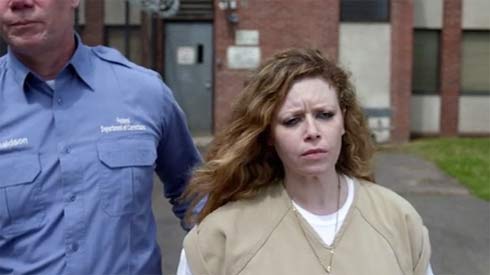Two of our favorite characters on Orange is the New Black spend time in the segregated housing unit (SHU) in season 3.
Season 3 spoilers ahead.
According to a recent report on solitary confinement, the practice of solitary confinement is overused and ineffective.
. . . evidence mounts that solitary confinement produces many unwanted and harmful outcomes—for the mental and physical health of those placed in isolation, for the public safety of the communities to which most will return, and for the corrections budgets of jurisdictions that rely on the practice for facility safety.
Nicky

Remember the bags of Vee’s heroin that Nicky hid in the vent in the laundry? Yeah. That heroin. Well, Nicky and Big Boo (Lea DeLaria) decide to get it out of the prison. Luschek (Matt Peters) will help them and will sell it in the outside world. They plan to use the tunnel that opens into the greenhouse.
That plan falls through. Nicky gets nervous and moves the bags into a fluorescent light housing in the laundry. It falls out. The girls in the laundry get stoned on it. Luschek gets all the remaining heroin from them, puts it in a toolbox with Nicky watching, and carries it out of the prison.
Nicky saves one tiny bag and sticks it under Luschek’s desk. She can’t bear to let it all go. The laundry girls talk, so Caputo (Nick Sandow) searches electrical. Of course, they find the little bag.
Nicky gets all the blame and is sent to SHU Maximum Security [see comments]. Luschek points the finger at her, and that’s all the proof anyone needs. There is no investigation. Nicky’s just carted off. Luschek is not blamed for anything.
This happens in episode 3. Nicky is gone for the rest of the season. Orange is the New Black just isn’t right without Nicky, you know?
I wish there had been an episode near the end of season 3 where Nicky returned. It would have been good to see the effect on her. Maybe that will happen in season 4.
Sophia

Motherhood is one of the main themes throughout all of season 3. Sophia’s story as a parent is particularly difficult and touching. Her son (Michael Rainey, Jr.) is doing the teen rebellion thing and she doesn’t know how to help with it. She doesn’t know if he needs mothering or fathering from her. She’s conflicted and upset. Her wife (Tanya Wright) says Michael is out of control.
She tries to help by having him come to the prison more often. Gloria (Selenis Leyva) is trying to see her teen-aged son more often, too. She arranges for him to ride with Sophia’s wife for the visits.
The boys get in trouble. Sophia blames Gloria’s boy. Gloria blames Sophia’s boy. Sophia’s wife stops bringing Gloria’s son to visit.
Tension between Sophia and the entire kitchen staff results in Sophia being targeted with transphobic bullying. It sweeps through the prison like a wave. She’s attacked and beaten up by other black women. They even take her blonde wig right off her head. Dirty fighting, that.
The fight wasn’t Sophia’s fault, but she gets taken to SHU “for her own protection.” Nothing happens to any of the instigators or attackers, although, to Gloria’s credit, she looks really sorry about what happened.
Misuse of Solitary
At least in Sophia’s case, Caputo argues against sending her to SHU. But the for-profit bosses running the prison overrule him. I have heard that putting transgender prisoners in solitary “for their own protection” is a common practice in prisons.
In both cases, SHU was used as a quick answer rather than a solution. In both cases, the person who will suffer the horrors of isolation for who-knows-how-long should have been handled in some other way.
There are documented cases where people are kept in isolation for YEARS. As many as 80,000 individuals may be held in isolation per day in federal facilities alone. “Long-term isolation can create or exacerbate serious mental health problems and assaultive or anti-social behavior, result in negative outcomes for institutional safety, and increase the risk of recidivism after release.”
Nicky and Sophia have decent mental health. What if Suzanne (Uzo Aduba) or Morello (Yael Stone) or the paranoid new prisoner Lolly (Lori Petty) ended up in SHU? What about the depressed Soso (Kimiko Glenn)? They would be basket cases when they came out. Or dead.
Piper (Taylor Schilling) did a couple of short stints in SHU in previous seasons, but she had more people working to get her out. What happens when no one is trying to get someone out?
I know Orange is the New Black is TV, not real prison. But I think it brings the injustice and inhumanity of the real prison system into focus for the general public with story lines like these for Nicky and Sophia.
It’s easy to understand why the real Piper Kerman came out of prison and wrote a book. And why she became an activist for prison reform. And why she continues to provide input into this series.

Leave a Reply